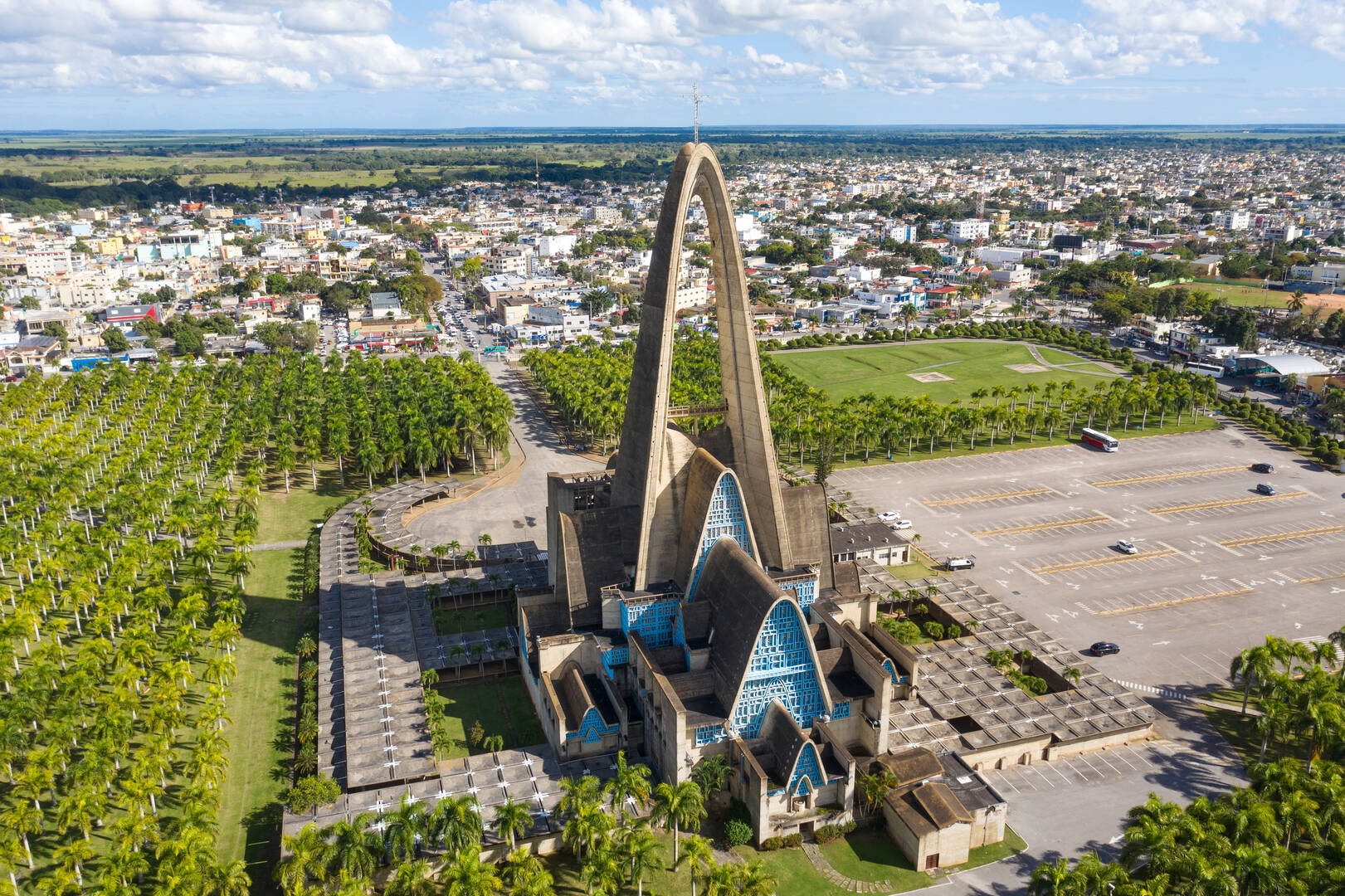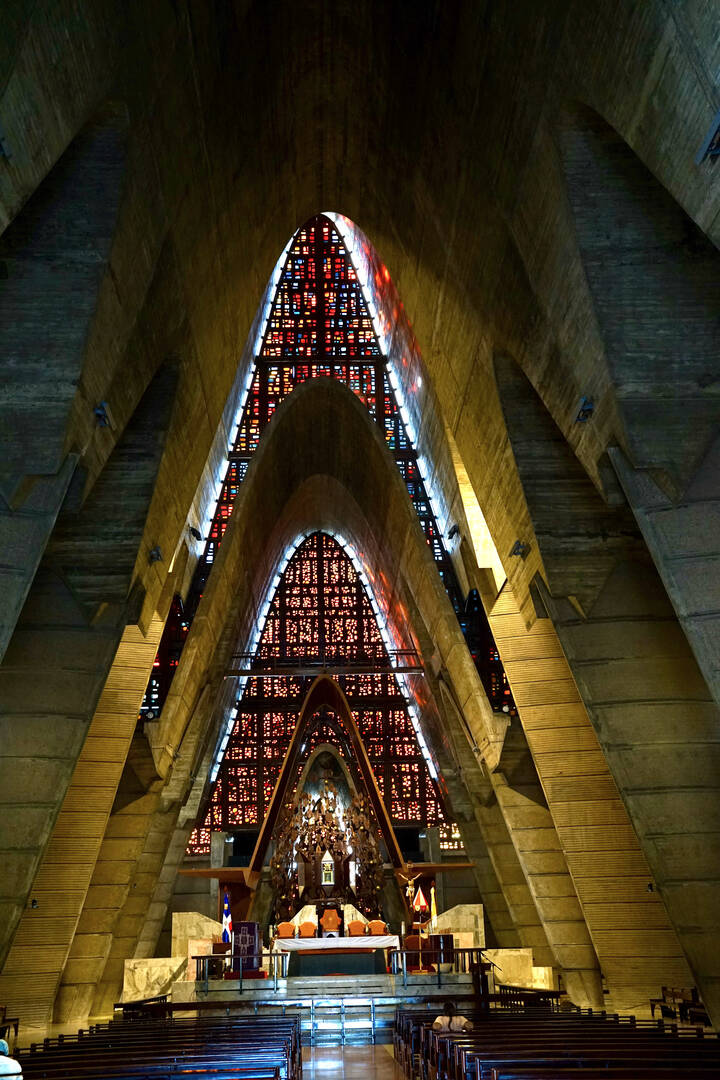Looking back, I’m still not sure if I believe it. But I think I could feel her presence from the moment we entered Salvaleón de Higüey, the city in the eastern Dominican Republic where our group visited the Cathedral Basilica of Our Lady of Altagracia.
I was born in the Dominican Republic, but the visit would be the first time I saw the original image of Our Lady of Altagracia (Our Lady of High Grace). I traveled with other journalists to the country last spring with Cross Catholic Outreach to witness the organization’s life-giving work.
Dominicans celebrate the feast of Our Lady of Altagracia on Jan. 21. The image, which depicts an infant Jesus, Mary and Joseph, is the most popular devotion in the Caribbean nation. It has been for centuries.
Antonio and Alonso de Trejo, two Spanish brothers, settled in Higüey with their families at the beginning of the 16th century. According to tradition, one of the men had two daughters—one 16 and the other 14. The youngest, referred to as “La Niña de Trejo” or “La Mariquita,” had a dream in which the Blessed Mother told her to ask her father to bring her Our Lady of Altagracia on his next trip to the port city of Santo Domingo. But no one had heard that title for the Blessed Mother before.

The father failed to find any such image on his trip. On his way back home, he spoke of his failed quest at an inn where he stayed. A fellow guest at the inn, an elderly man who overheard the story, unfurled the 13-by-18-inch image of Our Lady of Altagracia, or “Our Lady of High Grace,” and gave it to him.
The father gave the image to his daughter, who was delighted. But it vanished overnight and reappeared mysteriously in an orange tree grove. The family brought the image back to their home, but it mysteriously wound up in the grove again. Eventually, a church was built for the image at the location.
I’ve had a replica of the image of Altagracia in my room for years. It is a simple depiction, but there are so many things I love about it. For example, I like that the entire Holy Family is included. I also like that St. Joseph is kind of photo-bombing in the background. To me, it reflects the humility of a saint who doesn’t speak a word in the Gospels. He doesn’t want to take any attention away from Jesus or Mary. And I like that Mary seems to be smiling as she looks down at the baby Jesus.
“God has given us in the Virgin a sign of his closeness and of the infinite tenderness with which he cares for us.”
When I meditate on the image, I can’t help but see it as a partner to Our Lady of Guadalupe, whose feast is Dec. 12. They’re my favorite Marian devotions. La Guadalupana is pregnant with Jesus; her feast day is a couple of weeks before Christmas. Altagracia is caring for the infant Jesus, and her feast day is in January. In both images, Mary wears a mantle of stars. (The images are also the inspiration behind the colors of the national flags in their respective countries.)
Our group arrived at the Cathedral Basilica of Our Lady of Altagracia in the late afternoon. The basilica is enormous—you can see it from a distance. I couldn’t wait to see the image after seeing photographs of it on display in the basilica for many years. Similar to the modern Basilica of Our Lady of Guadalupe in Mexico City, Altagracia’s basilica is both sacred and practical. But that doesn’t come across in photos.
Once there, the concrete arches of Altagracia’s basilica seemed to be the signature architectural feature. You can see the principal arch (which is more than 260 feet tall) for miles. But there are smaller arches on all sides of the structure, which is built in the shape of a Latin cross. I’ve read differing explanations of what the arches symbolize, but the one that stood out to me is that the arches are outlines of the Altagracia image; the arches echo the Blessed Mother’s presence throughout the space.

In 2022, the bishops of the Dominican Republic issued a book to the country’s faithful on the occasion of the 100th anniversary of the Coronation of the Virgin of Altagracia by Pope Pius XI. The 240-page book, which is dedicated to “la Niña de Trejo,” covers historical aspects of the Altagracia event and includes a general explanation of Marian devotion.
“The mystery of the Virgin of Altagracia brings us closer to the mystery of her son and, at the same time, the mystery of who we are and who we are called to be,” the bishops wrote.
“The secret of Mary, and her true greatness, is being close to her son, and to her sons and daughters,” they wrote. “She is a bridge of union and communion: she brings humanity to God and God to humanity. When we unveil aspects of Mary, we at the same time find out something more about ourselves.”
Near the end of the book, the bishops include a message from Pope Francis to Dominicans on the anniversary.
“She is a bridge of union and communion: she brings humanity to God and God to humanity."
“God has given us in the Virgin a sign of his closeness and of the infinite tenderness with which he cares for us,” Pope Francis wrote. He called the image of Altagracia an invitation “to see through Mary’s eyes, that Jesus is present in each one of us and to remember that we are all part of the same human family.”
Walking into the basilica took my breath away. I didn’t make the connection right away, but because of the stained glass windows, everything has an orange cast—reflecting the orange grove in which the image was found. From the entrance, you can barely see the image itself. It is centered behind the altar with an elaborate symbolic orange tree made of silver and gold surrounding it.
Despite its small size, I was nevertheless transfixed. The large church was relatively empty—maybe 30 people scattered throughout. (You can get a sense of the space through a virtual tour offered on the basilica’s website.)
Eventually, our group made its way to the image itself. There is a small staircase up to Altagracia, and I was one of the first in my group to walk up. The image is behind a thick plate of glass and is set in a bejeweled frame with a golden crown on top of it. I couldn’t stop looking at the image.
I didn’t ask for Mary’s intercession. I didn’t pull out my phone to take a photo. I just stood there, off to one side, staring. I wouldn’t describe it as awe. It wasn’t worship either. I suppose I would just say that I felt that Mary was present there, and I felt completely at peace. I didn’t want to leave.
Eventually, a member of my group suggested we move so that others could get a turn. I made my way down the steps and past two large murals on either side of the altar. They depict the Blessed Mother surrounded by other saints.
Once in a pew, I began looking at the image again, without worrying about holding up the line. Mass would be celebrated shortly. I prayed for a short while and made my petitions.
When I opened my eyes, I looked back up at the image. A woman was there with her arms outreached, leaning against the glass. It was some distance away, so I couldn’t be sure. But the woman seemed to be sobbing. She must have come there, to our Mother, to be comforted.
As it turns out, I did, too. Jesus is present in each of us, as Francis said. And we are all part of one human family.








